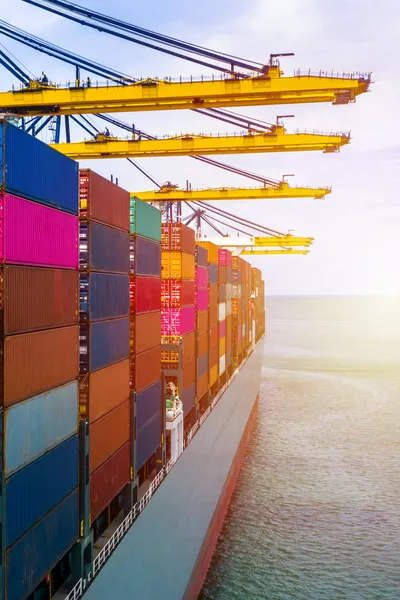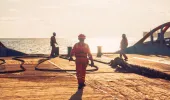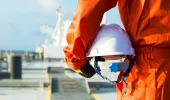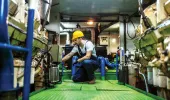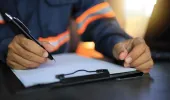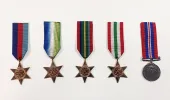The Maritime Labour Convention, 2006 (MLC) established minimum working and living standards for seafarers. The UK ratified the MLC and it came into force on 14 August 2014.
You can find full details of UK requirements on the GOV.UK MLC guidance page.
Complaints under the Maritime Labour Convention regulations
The Maritime and Coastguard Agency (MCA) will investigate any complaints from seafarers on board UK Flagged vessels and on other ships that call at UK ports.
The UK administration's contact details for seafarer complaints, which should be included in on-board complaints procedures/DMLC Part 2, is mlc@mcga.gov.uk
Any seafarer or worker (regardless of their employment status) working on a UK ship is protected by, and subject to, UK merchant shipping health and safety legislation.
You can find more information about MLC seafarer living and working rights on GOV.UK.
You can also read more about seafarer medical certification on GOV.UK.
-
Maritime Labour Convention FAQs
-
General MLC FAQs
-
This may be determined from a number of factors. MGN 471 (M) Maritime Labour Convention, 2006, definitions gives guidance based on MLC Resolution 7. In case of doubt, the MCA will consult the UK's MLC Tripartite Working Group.
A cadet is a seafarer. A cadet may be covered by a training agreement which provides the same protection as an MLC-compliant SEA. MGN 485 (M) MLC, 2006 - seafarer employment agreements application to trainees gives more guidance.
If the shipowner is any doubt they should contact the MCA for advice; any borderline roles will be considered on a case by case basis in consultation with UK's MLC Tripartite Working Group.
The MLC is ship-based rather than company based. The intent is to ensure that seafarers and authorities have a single point of contact for MLC issues on the ship. The definition of "shipowner" in UK legislation is explained in MGN 471 (M) Maritime Labour Convention, 2006, definitions.
-
Minimum Requirements for Seafarers to Work on a Ship
-
An outline of how the requirements would be applied is needed (how for example would the shipowner ensure that seafarers being recruited were not under the age of 18.)
Every seafarer on a seagoing ship is required to have a certificate of medical fitness.
The requirement does not apply to anyone employed on a fishing vessel, a pleasure vessel, an offshore installation while its on its working station.
Guidance on who is a seafarer is given in MGN 471 (M) Maritime Labour Convention, 2006, definitions.
This is not provided for in existing UK regulations, in STCW Manila Amendments, or MLC, 2006. However, the principle of "credit" for early revalidation in respect of Certificates of Competency is in Guideline BI/11 of STCW Manila Amendments and we will explore with other administrations whether they think this can be applied to medicals.
To work on any ship operating internationally, or for any UK STCW Certificate of Competency, a seafarer needs an ENG 1 or acceptable equivalent. (For small commercial vessels operating under the UK statutory Codes, and for crew member (other than the master) on some domestic passenger ships, an ML5 certificate is acceptable, but may not be internationally recognised.) Further information is in MSN 1839 (M).
ENG 1: The maximum fee for the standard medical certificate is given on the Medical Certificate page of this website. This fee is set in regulations, and is periodically reviewed. If additional tests are required (e.g. audiometry, step test) the Approved Doctor may charge extra for these, but should agree this with the seafarer or their employer before carrying out the test. If the seafarer is employed, the employer should meet the cost of the seafarer medical examination.
ML5: There is no statutory fee for the ML5 report. Check with the Doctor before they complete the report.
To view the current lists of MCA Approved Doctors (ADs) click here.
An acceptable equivalent medical certificate for an ENG 1 is a seafarer medical certificate issued by one of the national administrations listed in MSN 1815 Equivalent medical certificates.
The UK Oil and Gas medical is an industry/employer medical, not a statutory medical and so is not MLC-compliant. However, it may be suitable for someone working on an offshore vessel an an offshore worker (rather than as a member of the crew).
-
Conditions of Employment
-
The shipowner must be named in the SEA so that both the seafarer and maritime enforcement authorities have a single point of contact in case of of any problems. But the SEA may separately name the employer, where appropriate. A recommended format of the Seafarer Employment for UK ships can be found here: Model format for a Seafarer Employment Agreement.
MCA would take a pragmatic approach in these circumstances. An electronic copy of the SEA could be sent to the seafarer to take to the vessel, or to the vessel for the seafarer to sign, with the master signing on behalf of the shipowner. Alternatively, provided the seafarer and shipowner could sign their copy and exchange them electronically. This is acceptable provided that both parties are content to accept an electronic signature. But the principle that the seafarer must have time to read and take advice on the SEA, and that both sides must have agreed it, applies in all cases.
A volunteer is unlikely to fall under the definition of "seafarer" as the ship will not be their "normal place" of work. However, it is recommended that volunteer agreements are put in place between the shipowner and the volunteer crew members.
Yes, but MCA does scrutinise records carefully on such ships to ensure that seafarers are getting the minimum periods of rest required.
Yes. Seafarers must be given compensatory rest as soon as possible afterwards.
Yes. As the UK subscribes to both ILO 180/the MLC and to STCW, any exceptions authorised by the MCA under the Merchant Shipping (Hours of Work) Regulations 2002 must comply with both Conventions where applicable. MGN 566 (M) explains this. The changes are:
No exceptions to 10 hours rest in any 24 hour period or to the longest period of 6 hours, but the 10 hour period may be made up of 3 periods; may only extend of a maximum of 48 hours. Minimum of 70 hours rest in any 7 day period, any exception may only extend for up to 14 days, and then be followed by a period of at least twice the length of the exception.
-
Accommodation, Recreational Facilities, Food and Catering
-
No. All ships for which the keel is laid, or, for vessels which do not have traditional keel, reach an equivalent stage of construction, after the MLC comes into force internationally must be built to MLC standards for crew accommodation.
This is considered to mean the main thoroughfare(s) on large ships used for moving stores, laundry etc. The intention is to ensure that seafarers are not disturbed during their rest periods by noise or vibration. It does not include a normal pedestrian corridor, although additional sound insulation may be needed for cabins under such areas.
Those Ship's Cooks who are upgrading their certificate to UK (MLC 2006) Ship's Cook Certificate who have acceptable documentary evidence of meeting the appropriate competency standards as set out in MSN 1846 (M). This may include catering qualifications designed for shore-based employment. But this will not fully meet the required competencies for a Ship's Cook Certificate. A short module in Marine Cookery may be undertaken for the missing elements. Those unable to demonstrate they meet the required competencies will be required to undertake a full Marine Cookery Assessment.
The requirements are set out in MSN 1846 (M).
The candidate must be at least 18 years of age, meet the minimum competencies set out in MSN 1846 (M), hold a valid ENG 1 certificate, have completed at least 1 month sea service and have completed the following STCW short courses:
- Elementary First Aid
- Personal Survival Techniques*
- Personal Safety and Social Responsibility
- Basic Fire Fighting and Fire Prevention*
- Security Awareness
*These certificates must be less than 5 years old at time of application.
Guidance is also given in the Ship's Cook Application form MSF 4395. Substantial Equivalence: The MCA will automatically recognise a Ship's Cook qualification issued by other ratifying states after their date of ratification.
Ship's cooks certificates issued by an Administration that is neither a EU member State nor signatory to the Maritime Labour Convention, 2006 may be accepted to serve in the capacity of ship's cook, on UK flagged ships provided that IAMI has confirmed that it meets equivalent standards to the UK certificate. The procedure is set out in MSN 1846 (M).
-
Health Protection, Medical Care Welfare and Social Security Protection
-
Social security provisions of the MLC mainly deal with the government's responsibility to have adequate social security provisions for seafarers ordinarily resident in their territory. The shipowner must ensure that any mandatory contributions are paid. In addition, sections 4.1 and 4.2 deal with the social protection which shipowners are required to provide (medical care, and shipowner compensation and liability). A seafarer cannot be required to pay for or contribute to these elements of social protection.
It is expected that the financial security obligation will normally be achieved by either means of cover from a suitable P&I Club, or a policy of insurance from a recognised insurance provider which includes the necessary cover. A number of P&I Clubs have changed their rules to accommodate the shipowner financial obligations imposed by the MLC. In case of these Clubs, the ship's P&I Club Certificate of Entry will be sufficient evidence of financial security. In the case of insurance supplied by any other provider, the ship should be in possession of a Certificate of Insurance bearing a statement declaring that the mandatory financial security obligations under Standard 2.5.2 (Repatriation) and Standard 4.2.1 (Compensation for death and Long Term Disability) (including the 2014 Amendments) are insured for that ship by the policy. Alternative arrangements are permitted in UK law, but proposed alternatives should be discussed with the Maritime and Coastguard Agency (MCA) well in advance of business decisions being taken to ensure that appropriate standards can be met. "Self-insurance" arrangements are not considered an acceptable way of meeting these financial security obligations.
The current M Notice is Merchant Shipping Notice MSN 1768 (M) (also an amendment notice with the same number)
Alternative medicines and quantities to those treatments listed in the Medical Stores MSN.
In the tables in MSN 1768 (M), the items in column 2 are mandatory. The remaining columns (specifications and quantities) are recommended.
Owners and operators may, on the advice of a qualified medical practitioner or pharmacist, determine whether any additional or different quanitities, products or equipment are required, taking into account the factors identified below and any other relevant consideration the nature of the voyage and in particular:
- Ports of call, destination and duration;
- Type of work to be carried out during the voyage;
- nature of the cargo;
- number of crew
For example, anti-malarial drugs may be appropriate if a ship is operating in tropical areas.
Any pharmacist should be able to deal with your request, but shipping chemists (do a search on the internet) will have these stores readily available and will be familiar with the requirements and rules that apply. To ensure that the stores comply with UK pharmaceutical standards they should be sourced from the UK [or EEA] where possible.
MCA will not recommend or endorse anyone in particular.
-
Compliance and Enforcement
-
Yes. MCA will try to arrange an inspection to make efficient use of both the ship's and the surveyor's time. Arrangements should be discussed in good time with the CSM (where appropriate) or the relevant MCA office.
This largely depends on the size of the vessel and number of crew however to give an indication:
- Dredger - 8 hours' work - 10 crew;
- Container ship - 8 hours' work - 20 crew;
- RoRo ferry - 12 hours' work - 100 crew;
- Passenger ship - 4 days -1200 crew.
The time on the ship can be reduced by sending documentation in advance for checking.
The MLC Standard A5.1.4.7(c) and the ILO Port State Inspection Guidelines permit detention of a ship for a serious or repeated breach, or for any non-conformance which puts at significant risk the health and safety or security of seafarers.
If the ship is found not to be in compliance with the MLC then the surveyor would raise a non-conformity under the ISM Code inspection and the individual deficiencies against the MLC.
Regulation 12 of the Merchant Shipping (Survey and Certification) Regulations 2013 (S.I. 2013/1785) requires copy of the MLC to be carried but does not specify whether it has to be in hard form. Provided that all on board have reasonable access, the MLC may be carried as an electronic or hard copy.
Except for significant changes, DMLC Part II will only need re-approval at renewal.
MCA will take a pragmatic view. The seafarer always has the right to complain directly to the shipowner.
The statutory requirement is that these procedures are in place for MLC requirements. However, these could be incorporated into other broader company grievance or whistle-blowing procedures.
-
Small Vessel FAQs
-
Minimum hours of rest are set for the safety of the vessel and those onboard, an also to help protect the long-term health of the seafarer. It is for the owner to demonstrate to the inspector that the vessel is being operated in compliance with the requirements of the minimum hours of rest. There are no exceptions.
This may mean putting additional crew onboard to allow rest to be taken while still on a voyage, or by only permitting voyages that would allow the crew to rest in accordance with the requirements or another means that allows the crew to be adequately rested.
In particular in sailing/motor schools, the skipper may be the only seafarer onboard, but there may be also a trainee deemed by the skipper to be competent to take a watch. In such cases, the skipper may wish to allocate a watch on a long passage to that trainee, with standing orders to wake him/her in certain situations. This would allow the skipper to take their rest period. If the skipper is woken during their rest period, the voyage/rest plan may need to be adjusted to allow them to take their required minimum rest or compensatory rest.
Minimum hours of rest relate to the individual seafarer not to the vessel. So hours worked ashore, alongside, preparing, bunkering, and storing the vessel, on other vessels or in other employment accumulate towards the total number of hours worked by those employed onboard a vessel. This should be included when ensuring that sufficient hours of rest are provided. (In the case of work undertaken for other employers it is recognised that the employer may not be aware of hours worked, but due diligence should be exercised.)
The MLC does not apply to pleasure vessels.
However, if you employ crew on a pleasure vessel the Merchant Shipping and Fishing Vessels (Health and Safety at Work) Regulations 1997 (S.I. 1997/2962) and associated regulations apply, and a crew may be required. Guidance is published in MGN 474 (M).
A Seafarer's Employment Agreement (SEA) may be used on a pleasure vessel in lieu of the crew agreement (See guidance in MGN 474 (M). A SEA is a contract and in most jurisdictions any contract in force will be enforceable under civil/contract law whether or not there is a statutory requirement to have such a contract.
Where more than four crew are employed on a pleasure vessel, a crew agreement is required, in a form approved by the Secretary of State.
If the shipowner prefers to use individual SEAs they must comply with the MLC requirements and apply for an exemption from the MCA.
Guidance on crew agreements is published in MGN 474 (M).
Yes. Vessels to which the MLC applies that had their keels laid or were at a similar stage of construction after the MLC came into force are required to comply with the MLC accommodation standards. The UK has a substantial equivalence in place for accommodation on new small commercial vessels.
If a commercial vessel if manned by its owner(s), do they have to comply with the requirements of the MLC?
Yes. However, the UK interpretation of the MLC is that were the owner(s) is/are the sole seafarer(s) onboard, certain elements are not applicable. These are:
- The requirement to have a Seafarer Employment Agreement;
- Payment of wages;
- Entitlement to annual leave;
- The requirement for an onboard complaints procedure.
The full requirements of the MLC apply for any other seafarers onboard the vessel.
If no accommodation is provided, minimum required rest periods must be taken ashore. The MLC requires crew accommodation to be provided where seafarers are required to stay onboard the vessel. Other requirements of the MLC apply to the vessel.
Is a family member "helping out" on board considered a seafarer? If I carry additional people onboard who work on board, but are not involved in the navigation of the vessels, such as surveying staff or offshore technicians, does the MLC apply to them?
Under UK legislation, a seafarer is anyone employed, engaged, or working on a ship whose normal place of work is onboard the vessel, so it depends on whether these workers fall within that definition. Guidance is published in MGN 471 (M) Maritime Labour Convention, 2006, definitions.
No. If the vessel falls within the scope of the MLC. The only exclusions are vessels operating exclusively within inland waters, fishing vessels, pleasure vessels, warships and naval auxiliaries and ships of traditional build.
In addition, if a vessel operates within 60 miles of a safe haven in the UK on domestic voyages only, the vessel is not subject to inspections under the MLC. However, many of the regulations implementing provisions of the MLC nevertheless apply to vessels operating in these areas (e.g. requirement for an SEA, hours of work, medical stores, medical care, food and catering and health and safety regulations such as the Merchant Shipping and Fishing Vessels (Health and Safety at Work) Regulations 1997.) (S.I. 1997/2962).
If a vessel is normally engaged on voyages of more than 60 miles from a safe haven in the UK, or on international voyages and has seafarers onboard, (refer to MGN 471 (M) Maritime Labour Convention, 2006, definitions for the definitions and interpretations) it is subject to MLC inspections at least every three years. While it is engaged on UK domestic voyages within 60 miles of a UK safe haven, it is not subject to inspection for compliance with the MLC, but must still comply with the applicable UK regulations.
Volunteers are unlikely to be considered to be seafarers, as their normal place of work is not normally on the vessel. Guidance is published in MGN 471 (M) Maritime Labour Convention, 2006, definitions. MCA recommends that volunteers are covered by a volunteer agreement setting out what protection the shipowner will provide and any conditions the volunteer must meet.
The UK has interpreted the MLC's term "ships ordinarily engaged in commercial operations" to mean "not to be used as a pleasure vessel". Experience has shown that very few vessels operated by charities are used as pleasure vessels. If the vessel has seafarers onboard, the MLC applies in respect of those seafarers.
Renewables technicians being transported to windfarms to work on a daily basis are not normally considered to be seafarers. The MLC applies as appropriate to the seafarers who operate the vessel. For example, provisions on SEAs and wages, hours of work, and medical care apply but the crew accommodation requirements do not apply if the crew do not stay onboard.
The MLC applies to any vessel, although in the UK the inspection regime does not apply to those limited to domestic voyages within 60 miles of a safe haven in the UK. If crew accommodation is not provided onboard, provision must be made for seafarers to take their minimum hours of rest ashore.
On a small vessel, finding space for suitable recreational space on deck can be difficult. It may be the cockpit (with suitable weather protection) on a motor or sailing yacht.
Consideration must be given to ensure that the deck area is a safe place for the seafarer to be. There is a duty of care on the employer to provide a safe place of work for all onboard.
Consideration should be given, for example, to snap back zones from mooring and towing gear, hazards from booms and running gear or from any lifting appliances or hazards from any cargo being transported.
On a small vessel the internal recreational space may just be the saloon, shared with guests, which has a variety of uses due to the limited space available.
The MLC is not prescriptive about the recreational facilities to be provided, but includes the following guidelines:
Consideration should be given to including the following facilities at no cost to the seafarer, where practicable:
- Television viewing area and the reception of radio broadcasts;
- Showing films, the stock of which should be adequate for the duration of the voyage and where necessary changed at regular intervals;
- Sport and exercise equipment, table games and deck games;
- A library containing vocational and other books, the stock of which should be adequate for the voyage and where necessary changed at regular intervals;
- Facilities for recreational handicrafts;
- Electronic equipment such as a radio, television, video recorders, DVD/CD player, personal computer and software and cassette recorder/player;
- Where appropriate, the provision of bars for seafarers unless this is contrary to national, religious or social customs; and
- Reasonable access to ship-to-shore telephone communications, and email and internet facilities, with any charges for the use of these facilities being reasonable in amount.
It should be clear from documents available for inspection that financial security is in place which fulfils the requirements of the MLC, for example that it covers a seafarer receiving medical treatment, and that the cover lasts until the seafarer is able to return home, not just to the end of their contract.
A seafarer may not be required to provide their own insurance to pay for their medical care and repatriation.
Records of travel arrangements for seafarers previously repatriated should also be available.
Any cook or chef working on board a vessel operating more than 60 miles from a safe haven in the UK, or on any international voyage, where there are more than 10 or more seafarers on board must have a Ship's Cook Certificate of Competency.
If the cook/chef has a shore-based qualification that meets the requirements of Annexes 1 and 2 of MSN 1846 (M) they may be able to apply for the UK Ship's Cook Certificate of Competency, using their shore-based qualifications as evidence of prior learning.
A cook/chef holding cookery qualifications that are not specifically designed to meet the requirements of Annexes 1 and 2 of MSN 1846 (M), they will be required to complete the Assessment in Marine Cookery before applying for the UK MLC Ship's Cook Certificate of Competency.
For more information refer to the guidance in MSN 1846 (M) and MIN 531 (M)
The requirements are set out in MSN 1846 (M).
The candidate must be at least 18 years of age, meet the minimum competencies set out in MSN 1846 (M), hold a valid ENG 1 certificate, have completed at least 1 month sea service and have completed the following STCW short courses:
- Elementary First Aid
- Personal Survival Techniques*
- Personal Safety and Social Responsibility
- Basic Fire Fighting and Fire Prevention*
- Security Awareness
*These certificates must be less than 5 years old at time of application.
Guidance is also given in the Ship's Cook Application form MSF 4395.
Substantial Equivalence:
The MCA recognises a MLC Ship's Cook qualification issued by other ratifying states after their date of ratification.
Ship's cooks certificates of competency issued by an Administration that is neither a EU member State nor signatory to the Maritime Labour Convention, 2006 may be accepted to serve in the capacity of ship's cook, on UK flagged ships provided that IAMI has confirmed that their qualification meets equivalent standards to the UK certificate. The procedure is set out in MSN 1846 (M).
MCA does not accept unsupervised on-line training for those whose role on board includes preparing food in the galley. MIN 531 (M) lists the awarding bodies and qualifications which are recognised for use on UK ships.
There must be evidence on board of financial security to meet the shipowners' liability for:-
- Repatriation (A2.5.1)
- Payment of outstanding wages and providing for the necessary needs of seafarers pending repatriation in case of abandonment (A2.5.2)
- Compensation in case of occupational illness or injury or death (A4.2).
